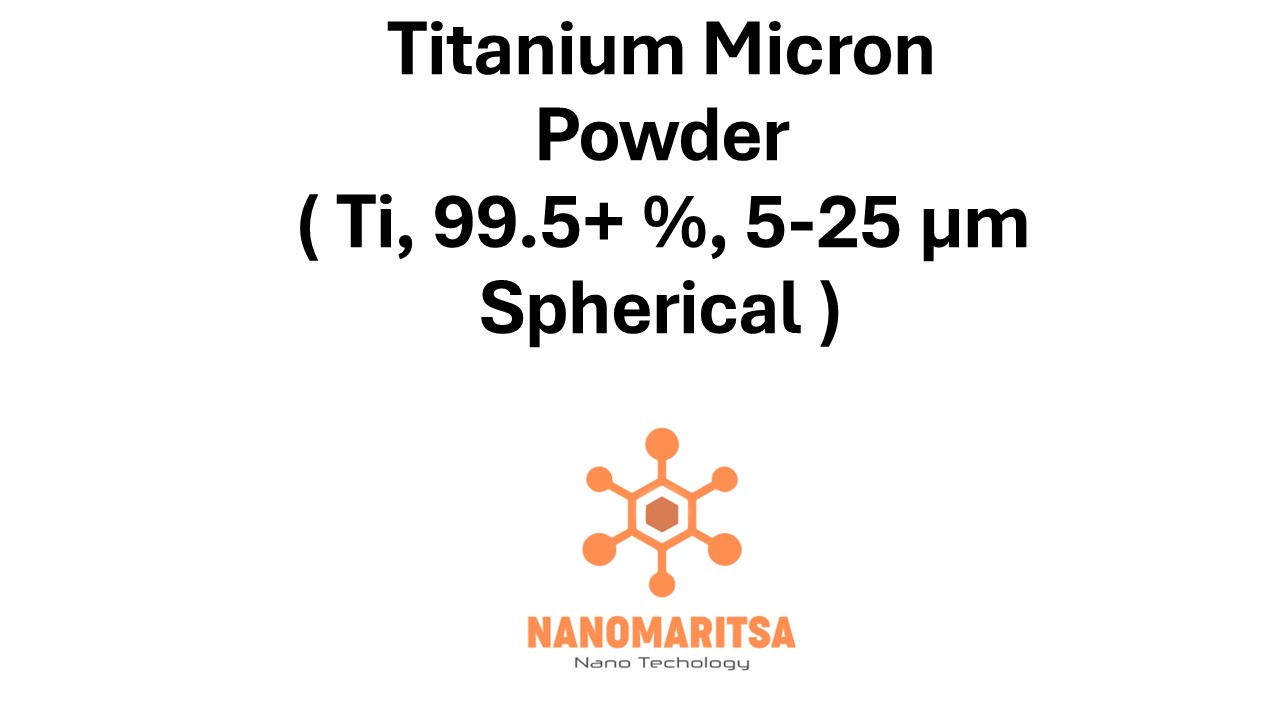Titanium Micron Powder (Ti, 99.5+%, 5–25 µm, Spherical) is a high-quality titanium powder notable for its excellent purity level—exceeding 99.5%—and its carefully controlled spherical particle shape. With particle sizes generally ranging between 5 and 25 micrometers, this powder achieves a favorable balance of flowability, packing density, and surface area, making it a strong candidate for demanding industrial applications. Titanium’s renowned strength-to-weight ratio, corrosion resistance, and biocompatibility have driven its widespread adoption in aerospace, automotive, medical, and additive manufacturing sectors.
- Key Properties
- High Purity (≥99.5%):
This purity level reduces contamination risks, ensuring the reliability of final components—particularly important in aerospace, medical, and electronics applications. - Spherical Particle Shape:
Spherical particles offer superior flow and packing characteristics, simplifying powder handling in 3D printing, thermal spraying, and powder metallurgy. - Particle Size (5–25 µm):
This range provides an optimal trade-off between surface area for reactivity and stable powder flow, benefiting both conventional and advanced manufacturing methods. - Corrosion Resistance:
Titanium’s natural oxide layer resists corrosion from a variety of chemicals and environments, extending product lifespans in marine, chemical processing, and biomedical contexts. - High Strength-to-Weight Ratio:
Titanium’s mechanical robustness combined with its low density makes it ideal for weight-sensitive applications, boosting efficiency in aerospace and automotive designs. - Biocompatibility:
Titanium’s inertness within the human body underpins its frequent use in implants, prosthetics, and other medical devices that require minimal risk of rejection.
- High Purity (≥99.5%):
- Applications
- Aerospace and Automotive:
Lightweight yet strong, titanium powder is used to produce engine parts, turbine blades, and structural components, reducing fuel consumption while maintaining or enhancing performance. - Additive Manufacturing (3D Printing):
Spherical titanium powders are sought after for metal 3D printing, where layer uniformity and part density are crucial for achieving high-precision, high-strength parts. - Medical Devices and Implants:
Thanks to titanium’s biocompatibility, fine powders assist in creating complex, patient-specific implants (e.g., dental and orthopedic) via powder-bed fusion technologies. - Powder Metallurgy:
Used to form near-net-shape parts with refined microstructures, titanium powder excels in producing high-performance components without extensive machining. - Thermal Spraying and Coatings:
The powder’s spherical shape and corrosion resistance support its use in protective coatings, enhancing wear and oxidation resistance on critical surfaces.
- Aerospace and Automotive:
- Advantages
- Enhanced Flowability:
Spherical particles maintain steady flow rates in hoppers and feed systems, preventing clogging and ensuring even layering in additive manufacturing. - Excellent Mechanical Properties:
Titanium’s toughness, ductility, and fatigue strength at both ambient and elevated temperatures make it an attractive choice for high-demand applications. - Corrosion Resistance & Durability:
An oxide film on titanium surfaces helps protect components against rust and chemical attack, promoting longevity and low maintenance costs. - Low Density, High Strength:
Ideal for lightweight designs where reducing mass leads to better energy efficiency—whether in aircraft structures or automotive racing components. - Biocompatibility & Safety:
Its compatibility with human tissues makes titanium indispensable for implants, reconstructive surgery, and medical-grade devices.
- Enhanced Flowability:
- Recent Trends and Research
- Advanced 3D Printing Techniques:
Developments in electron beam melting (EBM) and selective laser melting (SLM) are leveraging finer titanium powders for optimized mechanical properties and minimal porosity. - Next-Generation Alloys:
Researchers aim to enhance titanium-based alloys by adding elements like aluminum or vanadium, improving strength, creep resistance, and processability. - Automotive Weight Reduction:
As sustainability and fuel efficiency grow in importance, manufacturers are exploring titanium powders for engine parts and body components to reduce overall vehicle mass. - Biomedical Innovations:
Custom titanium scaffolds and implants using additive manufacturing open the door to personalized medicine, offering better integration and faster healing times. - Recycling and Resource Efficiency:
Industry initiatives are focusing on reclaiming titanium powder from support structures and overspray to minimize material waste in high-volume production.
- Advanced 3D Printing Techniques:
- Future Prospects
- Broader Additive Manufacturing Adoption:
With ongoing cost reductions and improved printer capabilities, spherical titanium powders will see expanding use in on-demand part fabrication. - Enhanced Aerospace & Defense Projects:
Greater reliance on lightweight, corrosion-resistant components in extreme operating environments will continue to drive titanium powder demand. - Emerging Medical Applications:
From patient-specific implants to next-gen prosthetics, titanium’s role in healthcare is poised to grow as manufacturing technologies and designs advance. - Eco-Friendly Manufacturing:
As corporations prioritize sustainability, titanium’s recyclability and material efficiency in powder-based processes will support greener production cycles. - High-Performance Alloys & Composites:
The pursuit of improved mechanical and thermal properties will inspire novel titanium-based materials, broadening the metal’s applicability across sectors.
- Broader Additive Manufacturing Adoption:
By combining a 99.5+% purity, spherical morphology, and 5–25 µm particle size, Titanium Micron Powder (Ti, 99.5+%, 5–25 µm, Spherical) stands out as a robust and versatile option for industries requiring strong yet lightweight solutions. Its corrosion resistance, biocompatibility, and high strength-to-weight ratio make it integral to cutting-edge manufacturing processes across aerospace, automotive, medical, and beyond—ensuring titanium’s continued prominence in the next generation of engineered materials.
| Measurement (gr) | 100 grams, 500 grams, 1000 grams |
|---|






